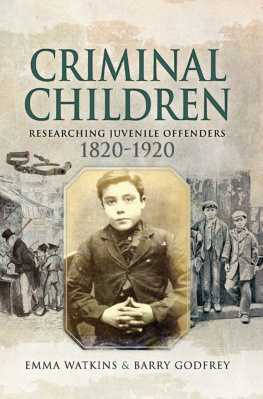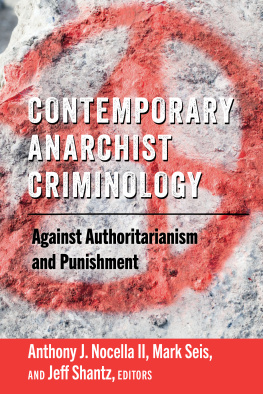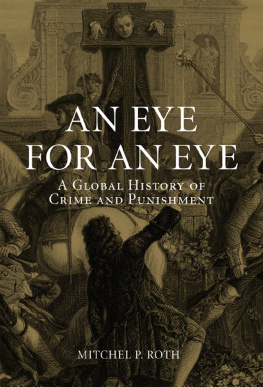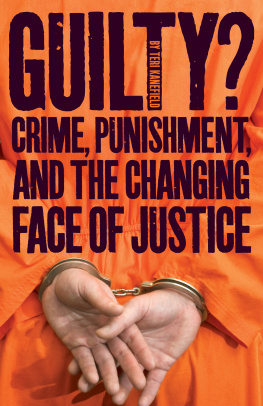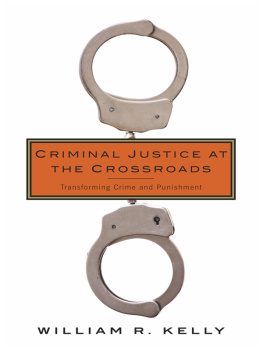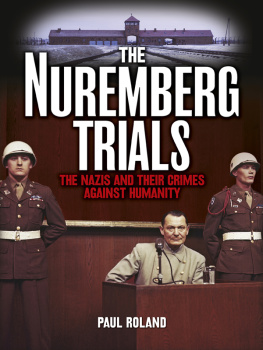
PUNISHMENT AND PROCESS IN INTERNATIONAL CRIMINAL TRIALS
INTERNATIONAL AND COMPARATIVE CRIMINAL JUSTICE SERIES
Series Editors:
Mark Findlay, Institute of Criminology, University of Sydney
Ralph Henham, Centre for Legal Research, Nottingham Trent University
This series explores the new and rapidly developing field of international and comparative criminal justice and engages with its most important emerging themes and debates. It focuses on three interrelated aspects of scholarship which go to the root of understanding the nature and significance of international criminal justice in the broader context of globalization and global governance. These include: the theoretical and methodological problems posed by the development of international and comparative criminal justice; comparative contextual analysis; the reciprocal relationship between comparative and international criminal justice and contributions which endeavor to build understandings of global justice on foundations of comparative contextual analysis.
Punishment and Process in International Criminal Trials
RALPH HENHAM
First published 2005 by Ashgate Publishing
Published 2016 by Routledge
2 Park Square, Milton Park, Abingdon, Oxon OX14 4RN
711 Third Avenue, New York, NY 10017, USA
Routledge is an imprint of the Taylor & Francis Group, an informa business
Copyright Ralph Henham 2005
All rights reserved. No part of this book may be reprinted or reproduced or utilised in any form or by any electronic, mechanical, or other means, now known or hereafter invented, including photocopying and recording, or in any information storage or retrieval system, without permission in writing from the publishers.
Notice:
Product or corporate names may be trademarks or registered trademarks, and are used only for identification and explanation without intent to infringe.
British Library Cataloguing in Publication Data
Henham, Ralph J., 1949-
Punishment and process in international criminal trials. -
(International and comparative criminal justice series)
1. Criminal procedure (International law)
I. Title
345.05
Library of Congress Cataloging-in-Publication Data
Henham, Ralph J., 1949-
Punishment and process in international criminal trials / by Ralph Henham.
p. cm. -- (International and comparative criminal justice)
Includes bibliographical references and index.
ISBN 0-7546-2437-4
1. Criminal procedure (International law) I. Title. II. Series.
KZ6310.H46 2005
345.05-dc22
2004028062
Typeset by IML Typographers, Birkenhead, Merseyside
Transfered to Digital Printing in 2010
ISBN 9780754684370 (hbk)
ISBN 9781138253940(pbk)
Contents
The material presented and discussed in this book arises from the authors work on the International and Comparative Criminal Trial Project, which was founded by the author and Professor Mark Findlay (University of Sydney) in 1999 and is based in the Centre for Legal Research at Nottingham Law School.
The purpose of this volume is to bring together several themes concerned with sentencing in international criminal trials that have been discussed in a number of articles and working papers produced by the author for the ICTP. A primary rationale for the collection is to emphasise the authors enduring concern with the ideology and legitimacy of international sentencing, and its broader significance for the philosophy and sociology of international criminal justice. In that sense, it is both a socio-legal and philosophical inquiry. However, it also has more pervasive theoretical and methodological implications for understanding socio-legal process comparatively (and internationally) due to the perspective of comparative contextual analysis which is adopted throughout the text. More particularly, it is argued that the theory, modelling and method suggested by this approach provides a tool for understanding the relationship between normative structures and human agency within the context of trial ideologies and cultures at the global and local level. As such, the analysis suggests a means for translating our aspirations for international penality into a reality which has moral legitimacy and delivers a form of collective justice that contributes to peace and reconciliation.
The author would like to thank Mark Findlay for his inspiration and perceptive criticism and also Roger Cotterrell for his encouragement and support. Thanks are also due to Nottingham Law School for its continued support of my work and the provision of a period of sabbatical leave. As always, I have benefited in innumerable ways from the constant support and encouragement of my wife Annemarie, to whom this book is dedicated.
I have drawn upon the following published materials in the preparation of this text, with substantial additions and revisions where appropriate:
Some Issues for Sentencing in the International Criminal Court (2003) International and Comparative Law Quarterly 52: 81114
The Philosophical Foundations of International Sentencing (2003) Journal of International Criminal Justice 1/1: 6485
Conceptualising Access to Justice and Victims Rights in International Sentencing (2004) Social & Legal Studies 13/1: 2155
Ralph Henham
Nottingham
This book is the first in a new series devoted to exploring the new and rapidly developing field of international and comparative criminal justice. The series aims to encourage authors from a wide variety of disciplines to engage with its most important emerging themes and debates, focusing on three interrelated aspects of scholarship which go to the root of understanding the nature and significance of international criminal justice in the broader context of globalisation and global governance.
Firstly, the series aims to address the theoretical and methodological problems posed by the development of international and comparative criminal justice. It therefore seeks to locate this new area of study within existing theoretical debates in criminology, legal philosophy, international relations, international law and the sociology of law. In addition, as editors, we wish to stimulate debate about the methodological issues raised in seeking to understand the relationship between human agency, structure and process within comparative and international justice contexts. The series will therefore include books dealing with such diverse topics as international criminal justice theory and comparative research methodology and policy.
The series also aims to promote scholarship that enhances our understanding of the operation of criminal justice processes and policy. In particular, it concentrates on developing comparative understandings of trial ideology, its transformation into normative structures, and the significance of trial process for trial participants and relevant communities of justice. In addition to comparative accounts of criminal justice processes, it includes discussions of comparative sentencing and penology and explores the interface between law and morality against the realities of cultural relativism.
Finally, the series reflects on the recursive relationship between comparative and international criminal justice and aims to build understandings of global justice on foundations of comparative contextual analysis. Significant areas include developments in the international legal order; contextual analyses of international criminal procedure and rights paradigms; victimology and international criminal justice; contemporary issues in alternative justice; and the role of the international criminal trial.




